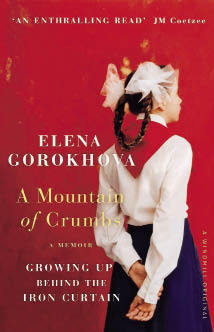At nursery school, along with her warm milk, little Lena Gorokhova imbibed the essence of survival in the post-war Soviet Union. It consisted of a game called vranyo — pretence:
My parents play it at work, and my older sister Marina plays it at school. We all pretend to do something, and those that watch us pretend they are seriously watching us and don’t know that we are only pretending.
The school teachers pretended that their pupils’ 100 per cent attendance at Young Pioneer meetings was unconnected with the padlocked door of the meeting hall. The women standing in line pretended they saw no contradiction between reports of record harvests and empty shops, or glittering construction projects and shoddy, just-built university dorms. As Lena becomes a teenager, vranyo smothers all her adolescent enquiries with a blanket of Soviet prudishness and hypocrisy. A Mountain of Crumbs is written above all with an almost painful tenderness that brought a lump to my throat more than once. Yet its vivid portrait of life during Brezhnev’s ‘stagnation years’ is also suffused with anger — the anger of a deceived generation.
These days many Russians look back with nostalgia on the peace and relative plenty of the Brezhnev era, for which conformity seemed a reasonable price to pay. The fear running beneath the surface — like the subterranean garbageman who terrifies Gorokhova at nursery — was bearable compared to the horrors of the previous decades. Soviet society was split, however, between the generation who had survived famine, terror and war, and their children, born in milder times, who could not understand why such blind faith in the regime was necessary. Bright, questioning Lena directs her battles not so much against the regime as against her own mother, a woman of iron will who devoted her energies to keeping her family safe. As Gorokhova writes:
Born three years before Russia turned into the Soviet Union, my mother became a mirror image of my motherland; overbearing, protective, difficult to leave. A survivor of the famine, Stalin’s terror, and the Great Patriotic War, she controlled and protected, ferociously.What had happened to her was not going to happen to us. She sheltered us from dangers, experience, and life itself by a tight embrace that left us innocent and gasping for air.
Gorokhova’s older sister Marina escaped by becoming an actress — paradoxically, a world in which she could express herself without artifice. Gorokhova herself learnt English — a process of liberation that she describes with infectious delight — and finally found a way out of the Soviet system by an expeditious marriage with an American student. At the airport, as she is leaving the country, she glances into her mother’s face and sees it ‘open, like a fresh wound’. Emigration gave Lena, as she saw it, her only chance of personal happiness; who could begrudge it her? Yet to her mother it must have felt like a betrayal, perhaps the most dreadful of all, in a lifetime of Soviet treachery.
Gorokhova did find a sense of freedom in America, where ‘we can change if we want to — transform ourselves — and no one will say we’ve betrayed the collective. We can simply live.’ Some years after her own move, her mother joined her in New Jersey and they seem to have healed their differences.
Yet we all know the saying: You can take the girl out of the Soviet Union . . . As a schoolgirl, Gorokhova was dismissive of the clichés about 19th-century Russian émigrés and their nostalgia for Russia:
Would I be miserable if, instead of lining up for bologna or cucumbers, I had to choose between something called an artichoke and something called shrimp?
Years later, writing in America, she described her Aunt Mila’s explanation:
The word nostalgia comes from ‘looking back’ — looking back at your homeland . . . back at things that used to seem insignificant and small.
Gorokhova’s memoir looks back with love at the lost world of the dacha, of mushroom-picking in the forest, and the utterly reassuring homeland contained within her mother’s apple-print polyester dress. Her prose brims with an elegiac emotion and sensuality which even Turgenev, in his own European exile, might have envied.






Comments